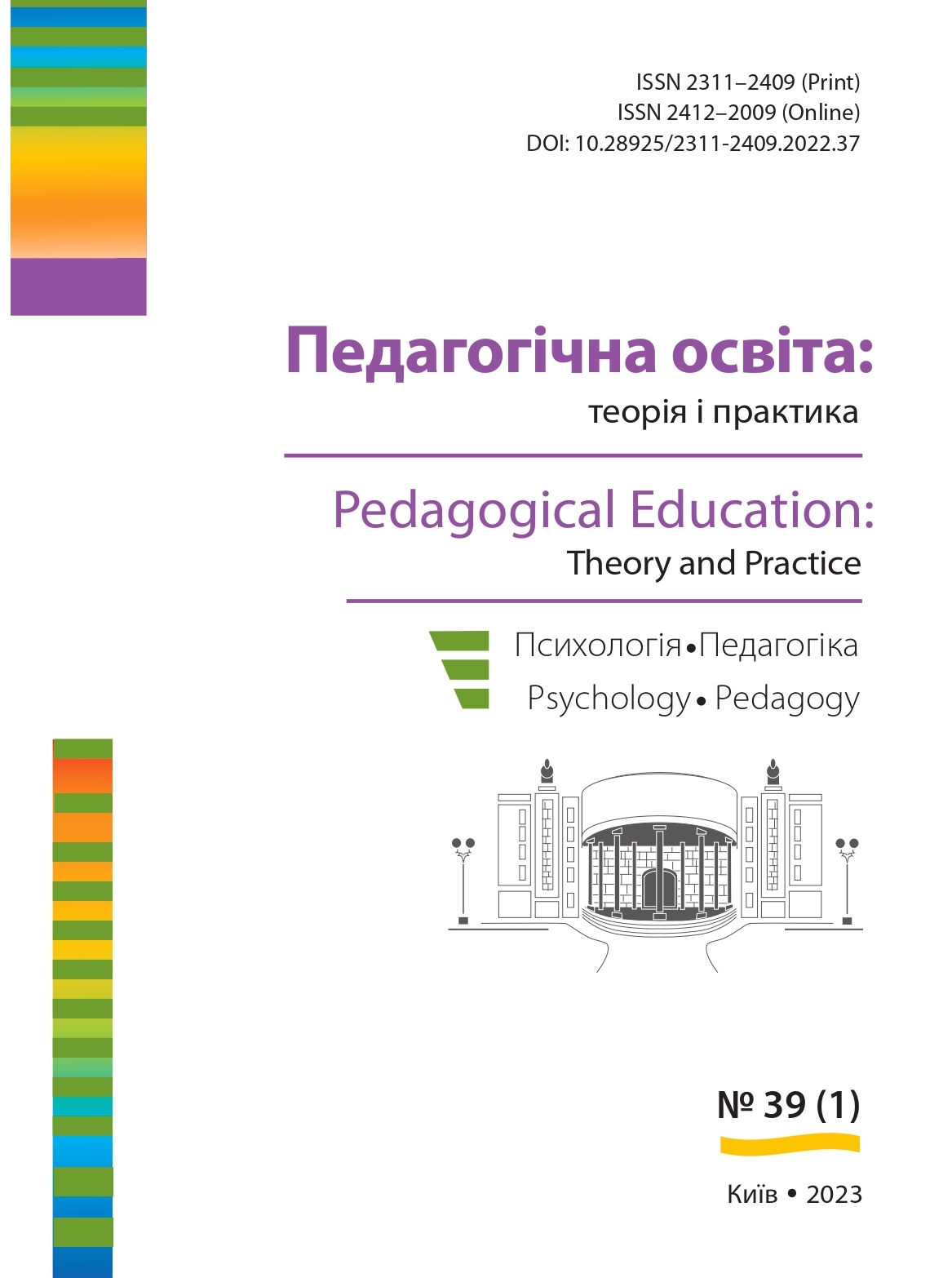Цифрові технології як інструмент консультативної діяльності в освіті дорослих
DOI:
https://doi.org/10.28925/2311-2409.2023.3911Анотація
У даній статті йдеться про використання цифрових технологій як інструменту
консультативної діяльності в освіті дорослих. Автори наголошують на необхідності цифрові-
зації вищої освіти в Україні, адже в умовах повномасштабного вторгнення освітяни не мають
втрачати на якості надання освітніх послуг здобувачам освіти трьох рівнів. Визначено, що
метою даної статті є розкриття потенціалу цифрових технологій як інструментів консуль-
тативної діяльності, огляд їхніх переваг і недоліків під час освітнього процесу. Завдання поля-
гають у дослідженні освітнього потенціалу цифрових технологій як інструментів консульта-
тивної діяльності в освіті дорослих, створенню стислого огляду переваг і недоліків наступних
цифрових ресурсів: Google Meet, Zoom, Gmail, месенджери та Moodle. Авторами схарактеризо-
вано особливості поняття «консультативна діяльність педагога», спрямованої на задоволення
індивідуальних професійних запитів студентів, вирішення практичних педагогічних завдань,
мотивацію до інноваційної діяльності студентів під час навчання, підтримку морального та пси-
хічного стану студентів, а також допомогу у визначенні індивідуальної освітньої траєкторії.
Закцентовано увагу на тому, що під час війни в Україні надважливе місце в освітньому процесі
посіли засоби й цифрові технології, які дозволяють організовувати текстовий зв’язок між сту-
дентами, педагогами та адміністрацією університетів у такий спосіб, щоб у кожного учасника
освітнього процесу була можливість вийти на зв’язок. До цифрових технологій текстового
зв’язку автори відносять наступні: електронні пошти, Google-chat, Telegram, інші месенджери
тощо. У висновках, як аргумент значущості, зазначено, що використання цифрових техноло-
гій під час навчання та консультування студентів вимагає від сучасного викладача обізнаності
у можливостях обраного цифрового ресурсу, його перевагах і недоліках, адже на думку авторів
статті, наразі не існує ідеальної технології для застосування. Обираючи той чи інший цифровий
ресурс, викладач має в першу чергу орієнтуватись на особливості курсу, специфіку групи, з якою
буде взаємодіяти, а також — власні уподобання.
Завантаження
Посилання
Карпенко А. С. Корпоративна пошта gmail сервісу google apps як інструмент діяльності органі-
заційно-навчальних підрозділів внз. Інформаційні технології в освіті. 2017. № 1 (30). С. 160–169.
Коваль Т. І., Аврамчук А. М. Використання системи Moodle для створення мультимедійних
електронних освітніх ресурсів з мовних дисциплін: зарубіжний і вітчизняний досвід / Педагогічний
процес: теорія і практика. 2016. Т.2. № 53. С. 93–99. doi: https://doi.org/10.28925/2078-1687.2016.2.9399.
Концепція розвиток цифрової економіки та суспільства України на 2018-2020 роки та за-
твердження плану заходів щодо її реалізації : Розпорядж. Каб. Міністрів України від 17.01.2018 р.
№ 67-р. URL: https://zakon.rada.gov.ua/laws/show/67-2018-р#Text (дата звернення: 20.02.2023).
Огляд google meet: відеоконференції тепер доступні кожному. UBI Конференц Холл. URL:
https://ubi-hall.com.ua/uk/2020/06/03/ohlyad-google-meet/ (дата звернення: 21.02.2023).
Пшемицька Є. Соціальні мережі та месенджери як інструмент для викладання історії в україн-
ських ВНЗ. Науково-теоретичний альманах Грані. 2022. Т. 25, № 6. С. 74–79.
Реалізація дистанційної форми навчання засобами платформи Moodle у процесі підготовки
майбутніх філологів / О. М. Павленко та ін. Engineering and Educational Technologies. 2019. № 7 (3).
С. 106–121
Сисоєва С. Педагогічні аспекти цифровізації освіти. Неперервна професійна освіта: теорія
і практика. Серія : Педагогічні науки. 2021. № 4(69). С. 24–32
Сорочан Т. Професійна діяльність андрагогів: сучасний погляд. Директор школи, ліцею,
гімназії. 2008. № 4. С. 27–32. URL: https://core.ac.uk/download/pdf/77240803.pdf (дата звернення:
02.2023).
Ткаченко Л. В., Хмельницька О. С. Особливості впровадження дистанційного навчання в освіт-
ній процес закладу вищої освіти. Педагогіка формування творчої особистості у вищій і загально-
освітній школах. 2021. Т. 3, № 75. С. 91–96.
Goldin C., Katz L. The race between education and technology. The Economic History Review. 2009.
Vol.63(3). Pp. 840 – 841. DOI: 10.1111/j.1468-0289.2010.00537_29.x
REFERENCES
Karpenko A. S. Korporatyvna poshta gmail servisu google apps yak instrument diialnosti
orhanizatsiino-navchalnykh pidrozdiliv vnz. [Karpenko A. S. Corporate mail gmail of google apps service
as a tool for the activity of organizational and educational units of universities] // Informatsiini tekhnolohii
v osviti. 2017. № 1 (30). S. 160–169. (ukr)
Koval T. I., Avramchuk A. M. Vykorystannia systemy Moodle dlia stvorennia multymediinykh
elektronnykh osvitnikh resursiv z movnykh dystsyplin: zarubizhnyi i vitchyznianyi dosvid [Koval T. I.,
Avramchuk A. M. Using the Moodle system to create multimedia electronic educational resources
in language disciplines: foreign and domestic experience] / Pedahohichnyi protses: teoriia i praktyka. 2016.
T.2. № 53. S. 93–99. doi: https://doi.org/10.28925/2078-1687.2016.2.9399 (ukr)
Kontseptsiia rozvytok tsyfrovoi ekonomiky ta suspilstva Ukrainy na 2018-2020 roky ta zatverdzhennia
planu zakhodiv shchodo yii realizatsii [Concept of development of the digital economy and society
of Ukraine for 2018-2020 and approval of the action plan for its implementation]: Rozporiadzh. Kab.
Ministriv Ukrainy vid 17.01.2018 r. № 67-r. URL: https://zakon.rada.gov.ua/laws/show/67-2018-r#Text
(data zvernennia: 20.02.2023). (ukr)
Ohliad GOOGLE MEET: videokonferentsii teper dostupni kozhnomu. [Google meet review:
video conferencing is now available to everyone] UBI Konferents Kholl. URL: https://ubi-hall.com.ua/
uk/2020/06/03/ohlyad-google-meet/ (data zvernennia: 21.02.2023). (ukr)
Pshemytska Ye. Sotsialni merezhi ta mesendzhery yak instrument dlia vykladannia istorii v ukrainskykh
VNZ. [Pshemytska E. Social networks and messengers as a tool for teaching history in Ukrainian
universities] // Naukovo-teoretychnyi almanakh Hrani. 2022. T. 25, № 6. S. 74–79. (ukr)
Realizatsiia dystantsiinoi formy navchannia zasobamy platformy Moodle u protsesi pidhotovky
maibutnikh filolohiv [Implementation of distance learning by means of the Moodle platform in the process
of training future philologists] / O. M. Pavlenko ta in. Engineering and Educational Technologies. 2019.
№ 7 (3). S. 106–121. (ukr)
Sysoieva S. Pedahohichni aspekty tsyfrovizatsii osvity. [Sysoeva S. Pedagogical aspects of digitalization
of education] // Neperervna profesiina osvita: teoriia i praktyka. Seriia : Pedahohichni nauky. 2021.
№ 4 (69). S. 24–32/ (ukr)
Sorochan T. Profesiina diialnist andrahohiv: suchasnyi pohliad. [Sorochan T. Professional activity
of andragogues: a modern view] // Dyrektor shkoly, litseiu, himnazii. 2008. № 4. S. 27–32. URL: https://
core.ac.uk/download/pdf/77240803.pdf (data zvernennia: 20.02.2023). (ukr)
Tkachenko L. V., Khmelnytska O. S. Osoblyvosti vprovadzhennia dystantsiinoho navchannia v osvitnii
protses zakladu vyshchoi osvity. [Tkachenko L.V., Khmelnytska O.S. Features of the introduction of distance
learning in the educational process of a higher education institution] // Pedahohika formuvannia tvorchoi
osobystosti u vyshchii i zahalnoosvitnii shkolakh. 2021. T. 3, № 75. S. 91–96. (ukr)
Goldin C., Katz L. The race between education and technology. The Economic History Review. 2009.
Vol.63(3). Pp. 840 – 841. DOI: 10.1111/j.1468-0289.2010.00537_29.x (eng)

